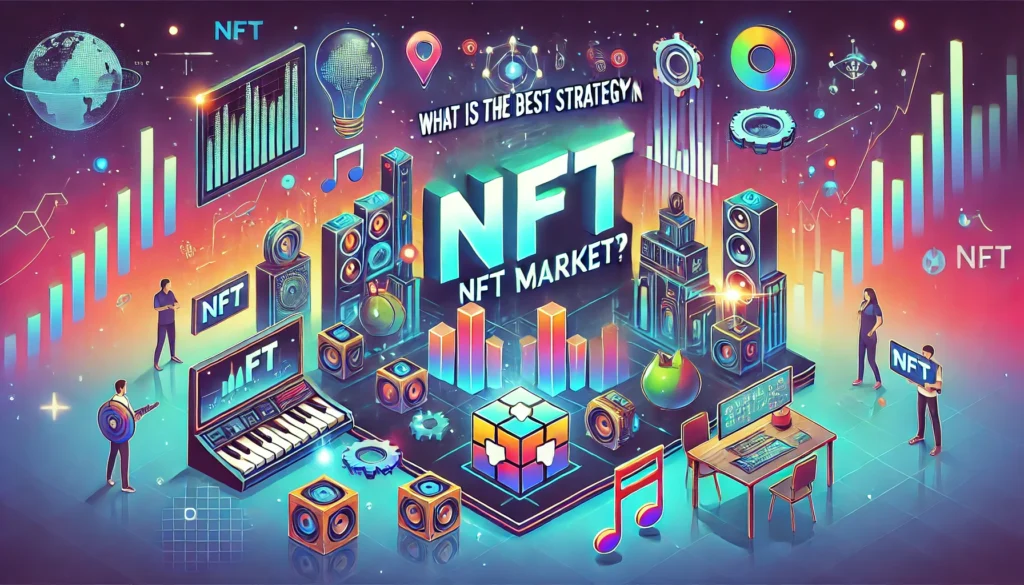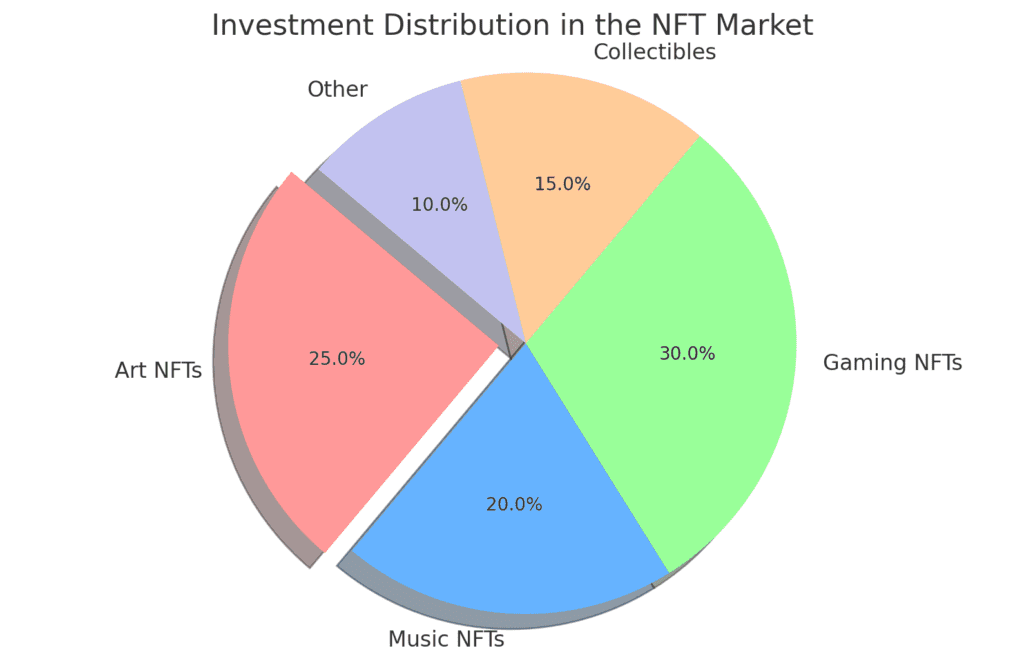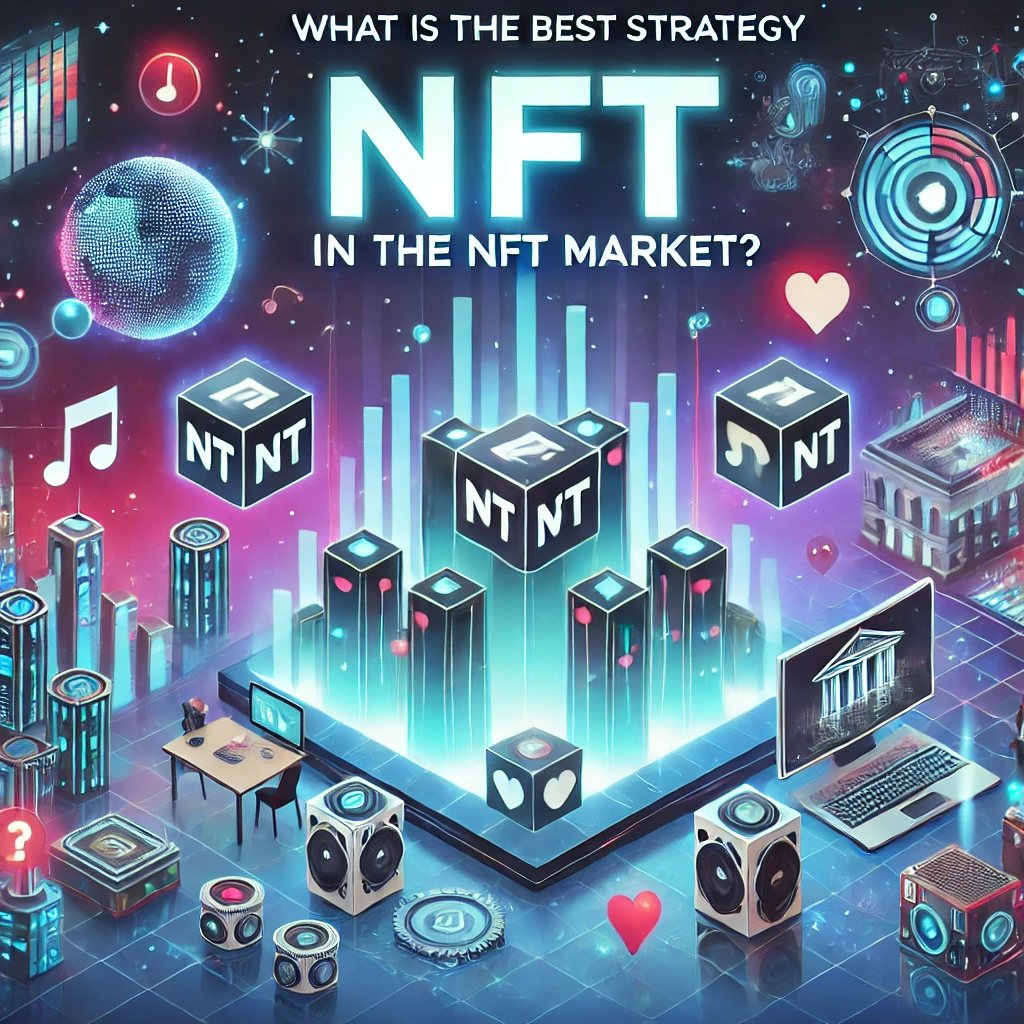The Non-Fungible Token (NFT) market has experienced explosive growth, transforming the digital landscape and redefining ownership of digital assets. As market participants, it’s crucial to understand the best strategies to navigate this burgeoning sector effectively. Particularly this comprehensive guide delves into the most effective strategies to excel in the NFT market, providing insights into investment approaches, creation techniques, and marketing tactics.

Understanding the NFT Ecosystem
The NFT ecosystem is multifaceted, encompassing art, music, gaming, collectibles, and more. NFTs are unique digital assets stored on a blockchain, ensuring authenticity and ownership. Their value is derived from scarcity, utility, and the reputation of the creator. Certainly understanding these elements is essential for developing a successful strategy.
Investment Strategies in NFTs
1. Diversification of NFT Portfolio

Diversification is a cornerstone of any robust investment strategy. In the NFT market, this means spreading investments across different categories and creators. By diversifying, investors can mitigate risks associated with market volatility and creator reputation.
- Art NFTs: Invest in both established artists and emerging talents.
- Music NFTs: Consider tokens from popular musicians and independent artists.
- Gaming NFTs: Focus on in-game assets from top-tier games and new, promising projects.
- Collectibles: Invest in rare and limited-edition collectibles from reputable sources.
2. Research and Due Diligence
Thorough research is critical when investing in NFTs. This involves analyzing the creator’s background, the rarity of the asset, and the market demand. Platforms like OpenSea, Rarible, and SuperRare provide detailed information about NFTs, which can aid in making informed decisions.
3. Long-term vs. Short-term Investments
Understanding the distinction between long-term and short-term investments can optimize returns. Long-term investments involve holding NFTs for extended periods, betting on the appreciation of value over time. Accordingly short-term investments focus on flipping NFTs for quick profits. Albeit balancing these two approaches can enhance overall portfolio performance.
Creation Strategies for NFT Artists
1. Building a Strong Personal Brand
For creators, establishing a strong personal brand is paramount. This includes creating a unique artistic style, engaging with the community, and maintaining a consistent presence on social media platforms like Twitter, Instagram, and Discord. Then a well-defined brand attracts loyal followers and potential buyers.
2. Collaborations and Partnerships
Collaborating with other artists, brands, and influencers can amplify reach and credibility. Partnerships can result in joint NFT projects that attract diverse audiences, boosting visibility and sales.
3. Limited Editions and Scarcity
Creating limited editions and ensuring scarcity can significantly enhance the value of NFTs. in this case by offering exclusive content and limited releases, creators can create a sense of urgency and exclusivity among buyers.
Marketing Strategies for NFTs
1. Utilizing Social Media Platforms
Social media is a powerful tool for marketing NFTs. Platforms like Twitter, Instagram, and TikTok allow creators and investors to showcase their collections, engage with potential buyers, and stay updated with market trends. Then regular updates, behind-the-scenes content, and interactive posts can drive engagement and sales.
2. Leveraging NFT Marketplaces
NFT marketplaces like OpenSea, Rarible, and Foundation are essential for listing and selling NFTs. These platforms offer tools for promotion, analytics, and community engagement. As can be seen optimizing listings with detailed descriptions, high-quality visuals, and appropriate tags can enhance visibility.
3. Hosting Virtual Events and Auctions
Virtual events and auctions are effective ways to market NFTs. Hosting live streams, virtual galleries, and timed auctions can create excitement and attract buyers. Collaborating with other creators and platforms for these events can further amplify reach.
Legal and Ethical Considerations
1. Intellectual Property Rights
Understanding and respecting intellectual property rights is crucial in the NFT space. Creators must ensure they have the rights to the content they tokenize and avoid infringing on others’ rights. Investors should also verify the authenticity and ownership of NFTs before purchasing.
2. Environmental Impact
The environmental impact of NFTs, particularly those on proof-of-work blockchains like Ethereum, has been a point of concern. Exploring and supporting eco-friendly alternatives, such as proof-of-stake blockchains, can align investments and creations with sustainable practices.
3. Regulatory Compliance
Staying informed about regulatory developments is essential. The legal landscape for NFTs is evolving, and compliance with local and international regulations is necessary to avoid legal pitfalls.
Future Trends in the NFT Market
The NFT market is continuously evolving, with new trends emerging regularly. Keeping an eye on these trends can help adapt strategies and stay ahead in the market.
1. Integration with Metaverse
The integration of NFTs with the metaverse is a significant trend. Virtual worlds where users can interact, create, and trade NFTs are gaining popularity. whereas investing in or creating NFTs that are compatible with metaverse platforms can provide substantial opportunities.
2. Fractional Ownership
Fractional ownership allows multiple investors to own a share of an expensive NFT. evidently this trend makes high-value NFTs more accessible and can drive up demand and liquidity.
3. Enhanced Interactivity
Interactive NFTs that offer dynamic content or change based on external factors are gaining traction. Thus these NFTs provide unique experiences and can attract a broader audience.
Conclusion
The NFT market offers immense potential for both investors and creators. By employing a well-rounded strategy that includes diversification, thorough research, strong branding, and effective marketing, participants can maximize their success in this dynamic space. Eventually staying informed about legal considerations and future trends will ensure continued growth and adaptation in the ever-evolving NFT ecosystem.
